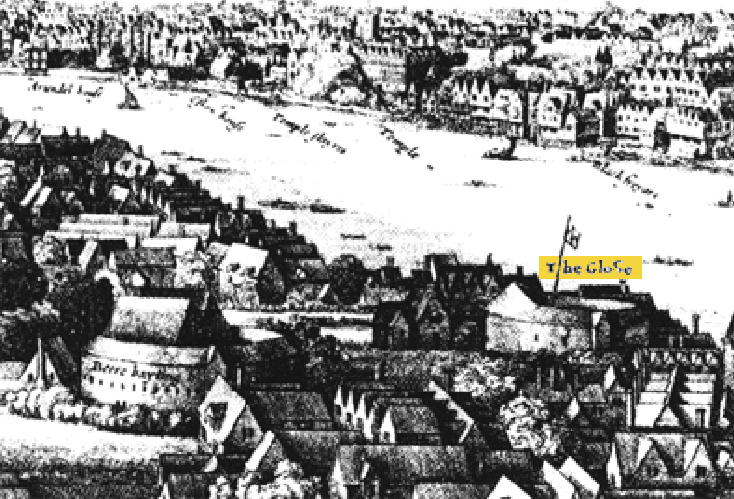 |
The south bank of the Thames, 1647. |
| Map of London in Shakespeare's time
|
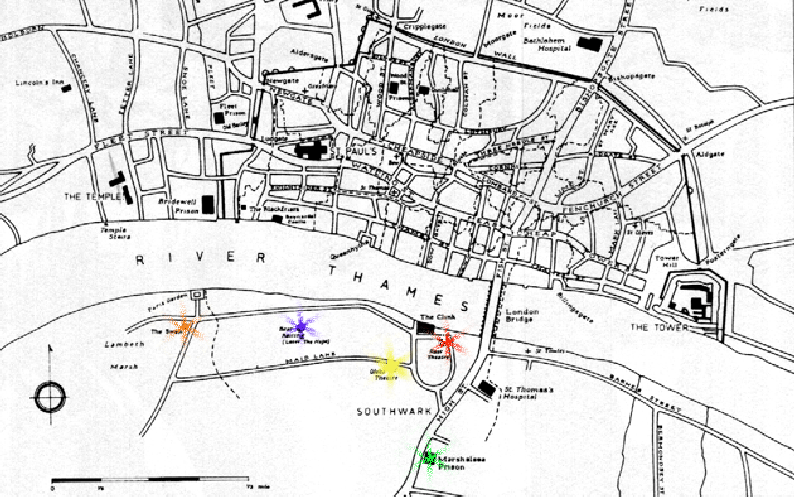 |
Entertainment in Shakespeare's London
In Shakespeare's time Stratford-upon-Avon was a small country town with about 200 houses and fewer than a thousand inhabitants. London, about 100 miles away from Stratford, already had 200,000 inhabitants. Clearly it was a far more exciting place than Stratford. Theatres, for example, had become very fashionable in London. They were attended by people from all walks of life, from young apprentices to noblemen and kings. Between the opening of The Theatre in 1576 and that of the second Globe in 1614, London's citizens could choose from sixteen public and private theatres. Of these at least six were large public ones. Shakespeare's time was no doubt the greatest period of theatrical achievement in the history of Western civilization.
1) What London looked like
 |
The south bank of the Thames, 1647. |
| Map of London in Shakespeare's time
|
 |
A Closer Look
1. What can you see in the drawing? Give a detailed description.
2. a) List the buildings on the map that are, or might
be, theatres.
b)Look at the boundaries of central London (the dark line)
and say where most of the theatres were situated.
3. Compare the map with the picture. Can you find any discrepancies?
2) A German traveller reports
A German traveller in Shakespeare's day kept a diary. He had this to say about entertainment in London:
Without the city are some theatres, where English actors represent almost every day comedies and tragedies to very numerous audiences; these are concluded with variety of dances, accompanied by excellent music and the excessive applause of those that are present.
| There is still another place, built in the form of a theatre, which serves for the baiting of bears and bulls. They are fastened behind, and then worried by those great English dogs and mastiffs, but not without great risk to the dogs from the teeth of the one and the horns of the other; and it sometimes happens they are killed upon the spot. Fresh ones are immediately supplied in the places of those that are wounded or tired. To this entertainment there often follows that of whipping a blinded bear, which is performed by five or six men, standing in a circle with whips, which they exercise upon him without any mercy. Although he cannot escape | 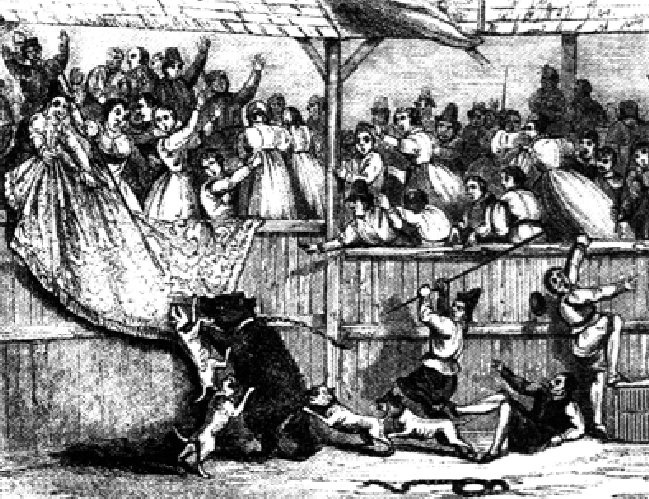 |
from them because of his chain, he nevertheless defends himself, vigorously throwing down all who come within his reach and are not active enough to get out of it, and tearing the whips out of their hands and breaking them. At these spectacles and everywhere else, the English are constantly smoking the Nicotian weed which in America is called Tobaca - others call it Paetum - and generally in this manner; they have pipes on purpose made of clay, into the farther end of which they put the herb, so dry that it may be rubbed into powder, and lighting it, they draw the smoke into their mouths, which they puff out again through their nostrils, like funnels, along with plenty of phlegm and defluxion from the head. In these theatres, fruits, such as apples, pears and nuts, according to the season, are carried about to be sold, as well as wine and ale.
From Paul Hentzner, Travels in England (l598).
without = here outside; to bait = to make an animal angry intentionally; to worry = here: to annoy; mastiff ['--]= type of dog, large and strong; to whip = to hit with a long piece of leather; mercy = kindness; on purpose = here: for that purpose; clay = heavy, firm earth, also used for making pots etc.; herb = plant that adds flavour, e.g. thyme; nostrils = openings in the nose; funnel = here: chimney; phlegm [flem] = substance produced in the nose and throat when s.o. has a cold; defluxion = (old use) spitting out of phlegm
A Closer Look
1. What does Paul Hentzner say about: a) theatre performances, b) theatre audiences, c) bear baiting?
2. What do you think was so entertaining about bear-baiting?
3) A letter to the Archbishop
Not everybody was happy with the theatres. The Mayor of London wrote to the Archbishop to complain. What do you think the Mayor might have said to the Archbishop? How might he have tried to get help from the church leader?
The letter is not easy for us to read today. Note down the main points as you read.
Our most humble duties to Your Grace remembered. Whereas by the daily and disorderly exercise of a number of players and playing houses erected within this City, the youth thereof is greatly corrupted and their manners infected with many evil and ungodly qualities by reason of the wanton and profane devises represented on the stages by the said players, the apprentices and servants withdrawn from their works, and all sorts in general from the daily resort unto sermons and other Christian exercises to the great hindrance of the trades and traders of this City and profanation of the good and godly religion established amongst us. To which places also do usually resort great numbers of light and lewd-disposed persons as harlots, cutpurses, cozeners, pilferers, and such like and there under the colour of resort to those places to hear the plays devise divers evil and ungodly matches, confederacies and conspiracies, which by means of the opportunity of the place cannot be prevented nor discovered, as otherwise they might be. In consideration whereof we most humbly beseech Your Grace ... to vouchsafe us your good favor and help for the reforming and banishing of so great evil out of this City, which ourselves of long time though to small purpose have so earnestly desired and endeavored by all means that possibly we could.
SirWilliarn Roe Lord Mayor of the City of London 25 February 1592
our ... remembered = formal opening to letter, showing respect; whereas = common formula used in introductions to laws, petitions, etc.; player = actor; wanton ['--] = morally uncontrolled; devise = device here: story, action of a play; apprentice [o'prent~s] = person learning a trade; to withdraw [-'-] = to take away; resort unto sermons (old use) = attendance at church; hindrance = s.th. that stops s.th. or s.o. else from working well; lewd-disposed (old use) = immoral, obscene; harlot ['--] (old use) = prostitute; cutpurse (old use) = pickpocket; cozener ['kAzno] (old use) = s.o. who cheats and deceives by trickery; pilferer (old use) = thief; under the colour of resort (old use) = here pretending to visit; match = here forming of pairs; confederacy = group of people joined for a certain purpose; conspiracy = plan made by a group to do something unlawful; to beseech (old use) = to ask urgently; to vouchsafe (old use) = to promise; to endeavor (usually endeavour) [m'devo] = to try
A closer look
1. List the Mayor's complaints about the theatre in your own words.
2. Having seen where most London theatres were located, can you now think why this was so?
3. a) What similarities are there between these two descriptions of
Elizabethan audiences (i.e. Paul Hentzner's and the Mayor's)?
b) What two
different purposes do they serve?
c) Which text seems to give the more objective account?
In your opinion
What sort of performances and other recreational events might city-dwellers protest about today?
4) The Globe Audience
| The Globe audiences probably
represented a wider range of citizens than have attended theatres in
Britain since that time. The cost of admission was low, to attract as
large a number as possible. The 'groundlings', who stood on the ground
in the orchestra where there were no seats, were made up for the most
parts of shopkeepers, craftsmen and members of what might be called the
lower bourgeoisie. There were also the apprentices, rowdy young men given to exhibitionism and liable to create disturbances out of sheer exuberance of spirit, but genuine lovers of the theatre, and usually well educated. There were also gentlemen of various degrees, professional men, courtiers, and members of the nobility. They would occupy twopenny or threepenny seats in the gallery. The higher members of the nobility would present themselves conspicuously in seats at the side of the stage itself or in chilling 'rooms'.Women were among the audience, often the respectable wives of tradesmen a fact which surprised foreign visitors to London. The capacity of the Globe was probably about two thousand or a little more, and a typical |
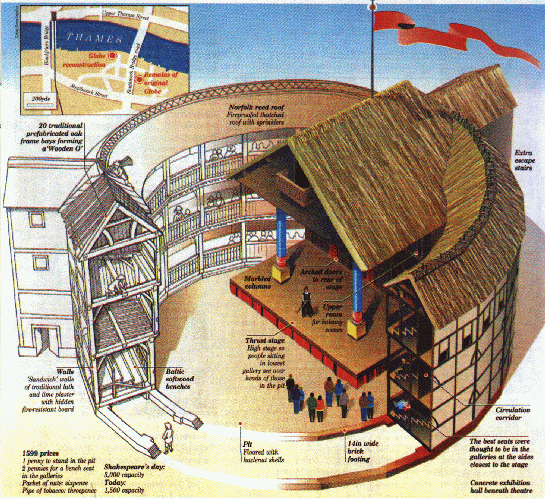
audience would consist of at least one thousand people. Puritan enemies of the theatre insisted that people came there to make assignations and carry on immoral activities; but although a minority may have done this, there can be no doubt whatever that the large bulk of the audience came to enjoy the play. |
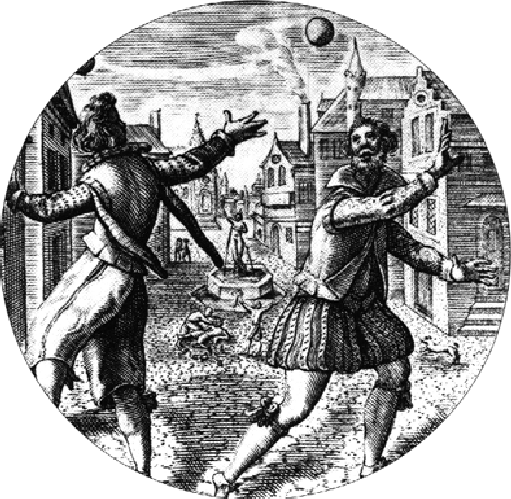 |
Ball game, 1634 by Georg Wither.
This game may look harmless, but it was actually very rough and sometimes led to injury. |
A closer look
List all the groups of people that made up a typical audience at the Globe Theatre and say where each group sat or stood.
In your opinion
Clearly in Elizabethan times people from all classes of society went to the theatre. How does this compare with theatre audiences in your country today?
5) The background to popular taste
In Elizabethan times some plays were written for academics and the nobility but most were written for commercial theatres such as The Globe, whose audiences were mixed and in which the 'groundlings' paid a penny for standing room.
... it was the groundlings who saved the drama from academic stiffness and preserved its essential bias towards entertainment - towards a high-spirited entertainment which was also criticism of life. [...] The taste of the groundlings shows a striking elasticity. Without abandoning their old favourites, they were ready to welcome new themes of classical inspiration [...].They made Shakespeare, too, an immediate box-office success. [...] Hamlet provides an outstanding instance of the groundlings' quickness of response. Its success was prompt and lasting, not only with 'tine wiser sort' at the Universities (1601), but with 'all', and especially in 'the vulgar's Element' (1604). And this relation to the groundlings was vital to Shakespeare's work, both practically and artistically.
It was vital to the whole evolution of the drama. Literary playwrights borrowed freely from popular sources, from folk traditions as such, or from material already familiar through older plays, sermons, street ballads or pamphlets.
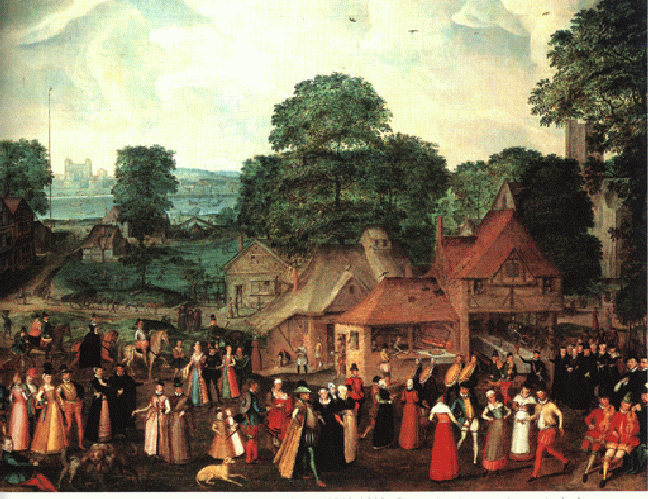 |
The Marriage Feast at Bermondsey by Joris Hofnagel
(1542-1600).
Bermondsey is now an inner suburb of London.
Describe the activities you can make out in the painting. |
A Closer Look